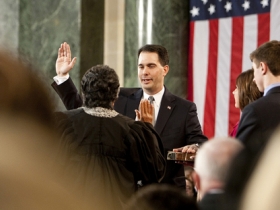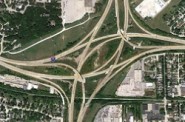Walker’s Massive Borrowing Scheme
His increase in road spending and refusal to increase gas tax could leave state paying 25% of transportation budget to debt service.

Gov. Scott Walker
Gov. Scott Walker has made a big deal of decreasing the state’s structural deficit and increasing its rainy day fund. But meanwhile his plans to increase spending on roads and freeways could leave the transportation fund so in debt that 25 cents of every dollar would be spent on debt service by 2023.
During an announcement last Friday at the headquarters of the International Union of Operating Engineers Local 139, Walker proposed a two-year $6.4 billion transportation plan. This is up from $5.9 billion in the 2011-2013 budget. It’s quite a big bump considering no new revenue options were offered despite a call from the bipartisan Transportation Finance & Policy Commission to raise the gas tax by 5 cents a gallon and to create a new vehicle-miles-traveled fee to cover the cost of roads.
In making this recommendation, the commission noted that gas tax revenue has actually been declining because of increases in automobile fuel efficiency and decreases in total miles traveled. Each year, this leaves an increasing gap between transportation spending and revenues. And spending will go up dramatically under Walker’s proposed budget.
A press release from the governor’s office says that $550 million will be dedicated for the Zoo Interchange project so construction can begin as early as 2015 or apparently as late as 2018. If you’re keeping track at home, the $550 million is just a part of the total cost of the $1.7 billion project. Also reported to be in the new budget is $236 million for the Hoan Bridge.
The official budget won’t be released until tomorrow, but Walker’s proposed budget is reported to include $662 million in new bonding. According to an Associated Press article, $307 million of new bonding will be dedicated to the Zoo Interchange and $200 million of new bonding will be dedicated for the Hoan Bridge. These two projects will help drive a $52 million increase over two years in the state Department of Transportation’s current bonding levels of about $610 million over two years.
A report from the bipartisan Transportation Finance & Policy Commission offers a grim assessment of the future debt levels. Even if the state issued no more transportation bonds after Fiscal Year 2013, the fund would be paying 13.5 percent of transportation monies to debt service by 2023. If the state continues to issue Transportation Revenue Bonds and General Obligation Bonds as it has in past years, at a total cost of $305 million annually, the amount of money going to debt service would a whopping be 24.9 percent by 2023.
But Walker intends to increase the amount of bonded indebtedness by $52 million over the previous budget, which is likely to mean the debt service would be in excess of 25 percent by 2023.
Where will the funds to pay the debt service on all of this new bonding come from? According to a story in the Journal Sentinel, “Walker spokeswoman Jocelyn Webster said the governor wants to sell state property and use the proceeds to pay off bonds.” As a solution to a long-term funding issue the idea of selling of state owned assets is, at best, a band-aid.
The Walker administration has indicated the assets they intend to sell could include state-owned power plants, making this a risky endeavor. The complexities, hurdles, and possible lawsuits, involved in selling such a public asset insure the sales won’t close quickly. And if they don’t? Those bonds will still need to be repaid, most likely from the general fund, further depleting funds from education, healthcare, and other vital services. In fact, Walker and the Republican legislature have already begun transferring money from the general fund to the transportation fund as part of the last biennial budget.
If this sounds familiar to Milwaukee County residents it’s because we’ve been down this road before. While Scott Walker was Milwaukee County Executive the budget regularly assumed sales of Park East land would occur and that those funds would be used to cover budget expenses. Of course these sales didn’t occur as planned, and budget adjustments and cuts became a regular event.
But to residents outside of Milwaukee County it might be hard to see how this troubling budget practice meshes with the image we were presented as candidate Walker. Remember the guy with the Brown Bag?
“Government should have to make some tough choices, and live within its means,” candidate Walker told us. He closed the advertisement with the final point of the message, “And don’t spend more than you have.”
That’s exactly what the bipartisan commission on transportation proposed: raise the gas tax and take other measures to stop spending more than the state has for road building. Apparently, that’s one tough choice the governor doesn’t want to make.
Featured Tweet
Walker to propose $6.4 billion for transportation – Milwaukee-The Business Journal buff.ly/132S8MP #WIdot #Infrastructure
— ibuildroads (@AndyPujats) February 18, 2013
Car Culture
-
It’s PARK(ing) Day, Let the Celebration Begin
 Sep 20th, 2013 by Jeramey Jannene
Sep 20th, 2013 by Jeramey Jannene
-
Why WisDOT Is Behind the Times
 Jun 12th, 2013 by Dave Reid
Jun 12th, 2013 by Dave Reid
-
Walker’s Freeway Farce
Dec 4th, 2012 by Dave Reid





















I wonder if transportation hawk Brett Healy is as upset about this plan as he is the Milwaukee streetcar?
Can you publish the list of road construction campaign donors and how much they’ll stand to benefit from this massive spending spree?
The governor’s plan to sell state assets to pay for road maintenance and repair is an admission that roads do not pay for themselves through so called user fees–gas taxes and vehicle registration fees. This explodes the great myth in the transportation debate: that transit requires subsidies but roads pay for themselves. In 2010 the governor rejected $810 Million in federal stimulus funds to extend Chicago-Milwaukee Amtrak service to Madison on the grounds that the state could not afford the operating and maintenance subsidies ranging from several million to several hundred thousand dollars. The governor has now admitted that the operation and maintenance of highways will require subsidies measured in hundreds of millions of dollars.
@Robert Bauman. Thanks for pointing that out, it certainly does… I was saving it for a future Car Culture:) ha
At least as concerning, if not more so, is that Walker is again proposing moving public transit out of the transportation budget. This could have the potential long term effect of cutting all state funding for transit which, unless we get a stable local funding source (which the Republicans oppose), would basically destroy the Milwaukee County Transit System entirely. It was a big fight to get transit put back in the transportation fund last year, and it meant that transit had to swallow a 10% budget cut. I’m not sure how many years in a row this can be fought before people finally just give up…
@Sam Yup… That topic deserves an entire article to itself..!
In addition, by admitting that roads require subsidies and then increasing such subsidies by $500 Million in this budget and by $400 Million in the last budget, the myth of Republican fiscal conservatism and belief in the free market is also exploded. Walker type Republicans happily embrace big government and Socialist style central planning when the services and infrastructure being subsidized serve their constituencies and special interest groups.
Bauman for Mayor!
Sorry…nothing against Tom but he’s becoming a do nothing in my eyes and the more I hear Bob’s ideas the more excited I become
Our gov never ceases to amaze with proposals that are truly bad for the economy:
high-speed rail, impoverishing public education, destroying public transport, destructive iron mines.
How long will he get away with it?
@bruf — As long as ~50% of the voting population remain actively ignorant and he has $10s of millions in outside money selling his message. In the 1980s Ronald Reagan got blue collar, union guys to start voting for him and his party and against their own economic interests. How long has that gone on? In the face of overwhelming evidence that trickle down doesn’t work? In the face of ever decreasing purchasing power for the middle class? I wish it wasn’t true, but people are basically lazy and stupid.
I’ve seen no discussion of how the looming federal sequestration will affect highway funding. Since highway projects are highly leveraged (with each dollar in state spending being matched up to 9-for-1 by the feds), even a small 5% sequester could increase State costs by up to 45%.
Example: If a $1 billion interstate highway project has 90% federal funding, costs are split $900m/$100m (federal/state). Now assume a 5% reduction in federal spending on this project, changing the split to $855m/$145m. In this example, the state’s expense goes up 45% (from $100 million to $145m).
Would Wisconsin be able to continue all these highway projects if its costs suddenly surged as much as 45%?
The fact is we need roads, we need to rebuild many of our existing roads and it needs to be paid for. What is wrong with selling State Assets? You mention the Park East and the desire of the County under Walker to sell those parcels to pay for services. However, you fail to mention all of the impediments to development that were put as conditions on selling those parcels. It also coincided with a decline in the economy (you missed a chance to blame Bush) You also fail to mention Gov Doyle taking 1.3 billion dollars out of the transportation fund while he was Governor and spending it on other things (for his donors??) while also leaving WI with a massive deficit. Cars are not the only users of roads. Billions of dollars of goods are shipped on roads every day. Great roads are needed to maintain this efficient delivery method.
@Chris Yes we do need roads, but shouldn’t we pay for them? Selling state assets isn’t a long-term solution to funding, it is using a one time income source to pay for an ongoing expense. Additionally, it is clearly a subsidy. My point about the Park East was they were counting on these to prop up the budget, much like with the current proposal, which is well risky. What happens if the sales don’t materialize? Oh I have my complaints with Doyle in regards to roads as well. In particular when the state stopped indexing the price of gas, as this will make for a long-term budget problem. Much like we see at the federal level. Quite simply the gas tax is way too low to support our road infrastructure.
Dave, interesting to hear concern about making sure we pay for things coming from your side. Why was this not a huge concern when Doyle was running major deficits? That never seems to be a concern unless it fits your agenda. So the only quibble you mention about Doyle and his raiding over 1.3 billion dollars from the Transportation budget is that he did not keep us in the top percentage of gasoline sales tax states? WI is now 13th in the nation which is still plenty high. Projects like the Zoo Interchange reconstruction are not something that come up in every budget. This project will last a generation or two and therefore extra funds are needed. If the sales don’t materialize then we will move to another funding option. This is a solid proposal and the fact that you called it a ‘scheme’ shows your one sided perspective toward Walker and road funding.
“This project will last a generation or two and therefore extra funds are needed.”
Only if funds are allocated to maintain it, and they are not. You have to understand roads aren’t just expensive to build. They are expensive to maintain. Very expensive, particularly when compared to train tracks. It’s simply the physics of running rubber tires on top of asphalt or concrete, compared to running steel wheels on steel tracks. Roads break down, and Walker refuses to acknowledge the reality and budget to maintain them.
Chris, Doyle’s net take from the Transportation fund was $429 million, not the $1.3 billion you cited. While he indeed took over $1.3 billion out, he offset most of that by adding $968 million to the Fund.
See table 5 on page 7 (pdf page 9) of:
http://www.wurta.com/wurta/pdfs/TransportationFinance.pdf
Tom, thanks for the link. In that link it states that more bonding (i.e. borrowing) was done in the last two years of Doyle’s budget to make up for some of the money he raided from the fund. So to say that he only took just over $400 million dollars would be incorrect. That money has to be paid back. It is also not an insignificant amount of money. This would be the very same bonding that people like Dave Reid are only now concerned with because it is being proposed by Walker. In addition, the failed stimulus program also dumped hundreds of millions of dollars of Federal money into our State of WI Transportation funds. Maybe someone can send me the link from a Reid article on a Doyle funding ‘scheme’ and his overwhelming concern for debt as a result.
I would also like to see the link to an article about something that predates this publication’s existence.
Also, I would like a link to the cost/benefit analysis WISDOT runs on all projects over $10,000,000… wait, they don’t do that? Oh.
Chris, you are correct that the bonds must be repaid, but that money is coming from general funds, NOT from the Transportation Fund. (The first year’s debt service WAS paid out of the Transportation Fund, and that debt service is included in the net $429 million.)
This stuff is certainly complicated. After reading the document again, I now believe the total net loss to the Fund was lower–about $326.2 million–the difference being $102.3 million in additional bonds (deposited into the Transportation Fund but repaid from general funds) approved and scheduled to be issued shortly after this report was issued in January 2011.
I believe the Wisconsin Legislative Reference Bureau is non-partisan and better informed than you or me; their take is the net cost of Doyle’s “raids” were $326.2 million ($428.6 million as of the report’s January 2011 date). I see no reason to doubt them.
If you look at that same document (pages 9-10), you see that Wisconsin borrowed over $2.1 billion (over and above the billion or so that Doyle put back in the Fund) for highways over that 10-year period. (This total excludes administrative, rail, and harbor bonds.) In 2011-13, Wisconsin borrowed ANOTHER $764 million for transportation:
http://www.dot.wisconsin.gov/about/docs/1-transfund.pdf
This brings Wisconsin’s highway borrowing up to nearly $2.9 billion since 2001 (over and above the money Doyle used to partially compensate for his “raids”). I think these $2.9 billion in bonds are what Dave Reid is talking about.
@Tom Yes this is a bit difficult to track but one thing I learn about the sequester is that it doesn’t impact the Highway Trust fund dollars. But since MAP-21 propped up the HTF with general fund dollars to the tune of $6.2 Billion these dollars will come under the 6% cut. Which amounts to about a 1% cut to federal highway dollars.